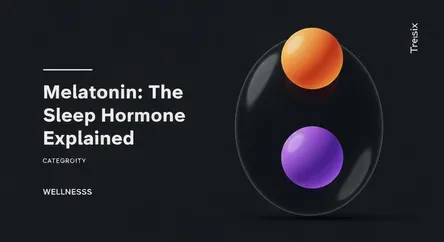Wellness
Melatonin: The Sleep Hormone Explained

Discover melatonin, the body's natural sleep hormone. Learn why it's a trending supplement for improving sleep quality and regulating your internal clock.
What is it?
Melatonin is a hormone naturally produced by the pineal gland in your brain. Often called the "hormone of darkness," its primary function is to regulate the body's internal clock, also known as the circadian rhythm. Melatonin levels rise in the evening as darkness falls, signaling to your body that it's time to prepare for sleep. Conversely, light exposure during the day suppresses its production, helping you stay awake and alert. This natural cycle is crucial for maintaining a consistent and restful sleep pattern, which is fundamental to overall health and well-being.
Why is it trending?
The interest in melatonin has surged due to a growing public focus on the importance of sleep hygiene. Modern lifestyles, characterized by increased screen time, irregular work hours, and high stress levels, often disrupt the body's natural melatonin production. As people seek natural alternatives to prescription sleep medications, over-the-counter melatonin supplements have become a popular choice. They are widely accessible and perceived as a gentle way to support the body's own sleep mechanisms, making them a go-to for those struggling with occasional sleeplessness.
How does it affect people?
People primarily use melatonin supplements to shorten the time it takes to fall asleep and to alleviate sleep issues caused by conditions like jet lag or shift work. By boosting melatonin levels before bedtime, individuals can help reset a disrupted sleep-wake cycle, promoting drowsiness and improving sleep quality. This can lead to better next-day alertness, improved mood, and enhanced cognitive function. Beyond sleep, melatonin also has antioxidant properties, contributing to its role in the broader wellness and mindfulness conversation as a tool for restorative health.